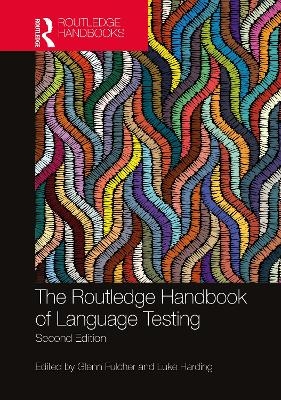
The Routledge Handbook of Language Testing
Routledge (Verlag)
978-1-138-38543-6 (ISBN)
This second edition of The Routledge Handbook of Language Testing provides an updated and comprehensive account of the area of language testing and assessment.
The volume brings together 35 authoritative articles, divided into ten sections, written by 51 leading specialists from around the world. There are five entirely new chapters covering the four skills: reading, writing, listening, and speaking, as well as a new entry on corpus linguistics and language testing. The remaining 30 chapters have been revised, often extensively, or entirely rewritten with new authorship teams at the helm, reflecting new generations of expertise in the field. With a dedicated section on technology in language testing, reflecting current trends in the field, the Handbook also includes an extended epilogue written by Harding and Fulcher, contemplating what has changed between the first and second editions and charting a trajectory for the field of language testing and assessment.
Providing a basis for discussion, project work, and the design of both language tests themselves and related validation research, this Handbook represents an invaluable resource for students, researchers, and practitioners working in language testing and assessment and the wider field of language education.
Glenn Fulcher is Professor of Applied Linguistics and Language Assessment. He has served as president of the International Language Testing Association and as editor of the journal Language Testing. His Routledge book Re-examining Language Testing was joint winner of the SAGE/ILTA book award, together with the first edition of this Handbook. Luke Harding is Professor in Linguistics and English Language at Lancaster University (UK). His research interests are in applied linguistics and language assessment, particularly assessing listening and speaking, World Englishes and English as a Lingua Franca, and language assessment literacy and professional ethics. He is currently co-editor of the journal Language Testing.
List of tables
List of figures
List of contributors
Acknowledgements
Editorial
Section 1: Validity
Chapter 1: Conceptions of validity.
Chapter 2: Articulating a validity argument.
Chapter 3: Inference and prediction in language testing.
Section 2: The Uses of Language Testing
Chapter 4: Social dimensions of language testing.
Chapter 5: Designing language tests for specific purposes.
Chapter 6: Revisiting language assessment for immigration and citizenship.
Section 3: Classroom Assessment and Washback
Chapter 7: Classroom based assessment.
Chapter 8: Washback: looking backwards and forwards.
Chapter 9: Assessing young learners.
Chapter 10: Dynamic assessment.
Chapter 11: Diagnostic assessment in language classrooms.
Section 4: Assessing the Language Skills
Chapter 12: Assessing speaking.
Chapter 13: Assessing listening.
Chapter 14: Assessing writing.
Chapter 15: Assessing reading.
Section 5: Test Design and Administration
Chapter 16: Test specifications.
Chapter 17: Evidence-centred design in language testing.
Chapter 18: Accommodations and universal design.
Chapter 19: Rater and interlocutor training.
Section 6: Writing Items and Tasks
Chapter 20: Item writing and item writers.
Chapter 21: Writing integrated tasks.
Chapter 22: Test-taking strategies and task design.
Section 7: Prototyping and Field Tests
Chapter 23: Prototyping new item types.
Chapter 24: Pre-operational testing.
Chapter 25: Piloting vocabulary tests.
Section 8: Measurement Theory in Language Testing
Chapter 26: Classical test theory.
Chapter 27: Item Response Theory and Many-Facet Rasch Measurement.
Chapter 28: Reliability and dependability.
Chapter 29: Scoring performance tests.
Section 9: Technology in Language Testing
Chapter 30: Validity and the automated scoring of performance tests.
Chapter 31: Computer-based testing.
Chapter 32: Corpus linguistics and language testing.
Section 10: Ethics, Fairness and Policy
Chapter 33: Ethics and fairness.
Chapter 34: Standards in language proficiency measurement.
Chapter 35: Quality management in test production and administration.
Epilogue
Chapter 36: Language testing: where are we heading?
Index
| Erscheinungsdatum | 17.12.2021 |
|---|---|
| Reihe/Serie | Routledge Handbooks in Applied Linguistics |
| Zusatzinfo | 30 Tables, black and white; 23 Line drawings, black and white; 4 Halftones, black and white; 27 Illustrations, black and white |
| Verlagsort | London |
| Sprache | englisch |
| Maße | 174 x 246 mm |
| Gewicht | 1260 g |
| Themenwelt | Schulbuch / Wörterbuch ► Wörterbuch / Fremdsprachen |
| Geisteswissenschaften ► Sprach- / Literaturwissenschaft ► Anglistik / Amerikanistik | |
| Geisteswissenschaften ► Sprach- / Literaturwissenschaft ► Literaturwissenschaft | |
| Geisteswissenschaften ► Sprach- / Literaturwissenschaft ► Sprachwissenschaft | |
| ISBN-10 | 1-138-38543-3 / 1138385433 |
| ISBN-13 | 978-1-138-38543-6 / 9781138385436 |
| Zustand | Neuware |
| Haben Sie eine Frage zum Produkt? |
aus dem Bereich


